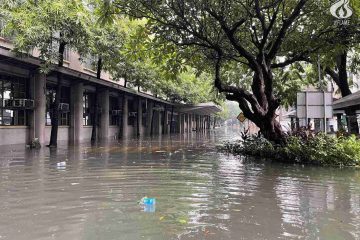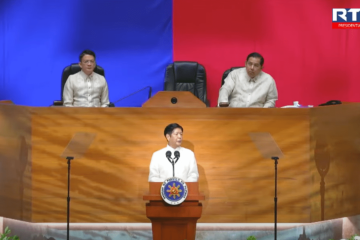
SEN. Risa Hontiveros denounced the current administration’s “war on drugs” that has claimed thousands of lives, saying the government should focus on implementing humane alternatives as means to eradicate illegal drugs in the country.
“Let’s not embrace a culture of destruction. If we are to truly build a better nation, we must begin by recognizing the value of each human person and in every human struggle. […] Let us offer a hand of hope not of death for our country,” Hontiveros said in a forum held April 20 at the Thomas Aquinas Research Complex.
Hontiveros said drug-related problems must be seen as a public health issue rather than a criminal case.
“Sa palagay ko, ang pinakamagandang programa sana dahil sila ang pamahalaan, ay […] kanselahin na iyang (Oplan) Tokhang na iyan kasi discredited na approach ‘yan sa illegal drug problems on all fronts at mas bigyang daan ang seryoso, ‘yung mga alternatibong hinahain,” she said.
Hontiveros filed the Barangay Rehabilitation and Treatment Bill that will allow the creation of barangay-based programs and services related to drug issues in cooperation with the Department of Health and the Philippine National Police (PNP).
The bill also seeks to be an alternative for Oplan Tokhang, the PNP-operated drug campaign in the country that has killed thousands.
Hontiveros, moreover, noted that primary institutions such as the family, school, and media should act as social controllers of crime and addiction.
“Naniniwala ako na lahat ng mabuti at lahat ng masama ay nagsisimula sa tahanan, sa pamilya. So lahat din ng pagbabago ay doon pwede magsimula. […] ‘Yung tamang pagpapalaki sa ating mga anak, ‘yung makatarungan at mas pantay-pantay na relasyon ng lahat ng mga family members sa isa’t isa,” the senator said.
“Syempre mula sa tahanan, lilipat tayo sa paaralan kaya ganun na lang kahalaga ‘yung integration ng mental health sa curriculum,” Hontiveros added. “‘Yung effect ng media [ay ito ang] humuhubog sa kamalayan ng lipunan kung paano iintindihin ‘yung problema ng illegal drugs.”
Hontiveros, a former representative of Akbayan party list, is also a socialist and journalist.
Asst. Prof. Maria Carinnes Gonzalez, research associate of the UST Research Center for Social Science and Education, likewise expressed her opposition on the “war on drugs” as a means to reduce criminal rate in the country.
“I don’t see why you should find joy, calm, and peace [in extrajudicial killings.] It’s a very class-based peace that you’re wishing for. But wait until it gets to your door. Nasa urban poor lang kasi [ang focus] e. Kapag umabot na ‘yan sa lower middle class, doon niyo masasabing ‘may mali sa sistema.’” Gonzalez said.
Gonzalez argued that programs for harm reduction such as the Needle Exchange Program (NEP) should be considered by the government as a possible way to lower drug addiction cases in the country.
NEP aims to lessen the risk of HIV/AIDS transmission to injecting drug users, a term used for drug users who inject drugs in their body instead of sniffing it. The program requires the users to surrender their old hypodermic needle to NEP centers and hospitals in exchange for a new needle.
“In all of the researches done in countries who practice it (NEP), the usage of drugs actually went down. […] People who suffer from drug substance abuse, they become solitary,” Gonzales said.
“When you interact with people from the government and exchange needles with them, somehow you interact outside your circle. ‘Yung mga nakaka-encounter mo, they shape you. […] And soon enough you could insert some harm reduction,” the professor added.
The forum titled REHABOLUSYON: Rehabilitasyon Patungo sa Makataong Solusyon was organized by the UST Sociological Society. F MARIA EDEN T. DINO



